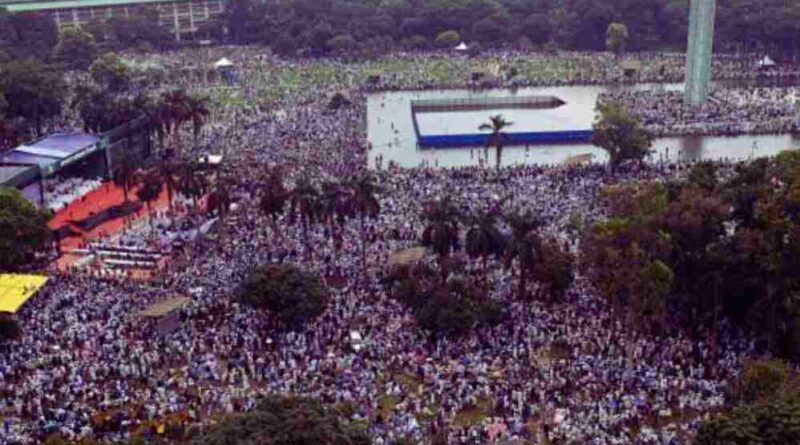Historic Shift: Jamaat-e-Islami Stages Landmark Rally in Dhaka Amid Political Tensions
In a move that has sparked intense political chatter and public curiosity across Bangladesh, the Jamaat-e-Islami party took to the streets of Dhaka in an unprecedented large-scale public rally—its first major gathering in the capital in over a decade. The political landscape of Bangladesh may be on the cusp of transformation as the long-controversial party reintroduces itself to the public arena after years of relative silence.
Thousands of supporters gathered in the heart of the city, waving party flags, chanting slogans, and calling for systemic reform ahead of the upcoming national elections. The demonstration, peaceful yet powerful, marked what many observers see as Jamaat-e-Islami’s strategic re-entry into mainstream politics—a calculated effort to rebrand its image and revive its relevance in a nation deeply divided over its political future.
A Surprising Return to the Capital
For years, the Jamaat-e-Islami party had been largely sidelined. Once a formidable force in coalition politics, the party saw its influence diminish drastically following widespread criticism over its alleged role in the 1971 Liberation War and subsequent crackdowns by past governments. Many of its top leaders were tried and convicted for war crimes, and the party was stripped of its ability to contest elections under its name.
So, when Dhaka woke up to the sight of massive processions making their way to the rally venue, it wasn’t just a political gathering—it was a statement.
Eyewitnesses reported tight security in and around the rally site, with law enforcement visibly present but maintaining a hands-off approach. The city’s normally buzzing traffic corridors were clogged with processions that stretched for blocks, many arriving from rural and suburban regions. The crowd was notably younger than in past eras, hinting at a possible generational shift in the party’s support base.
Messaging Focused on Economic Hardship and Democratic Rights
Speakers at the event largely steered clear of the party’s controversial past. Instead, the narrative was refreshingly forward-looking. Key figures addressed issues such as rising inflation, youth unemployment, the erosion of democratic space, and the alleged authoritarianism of the current regime.
“Today is not about looking back,” one senior leader said from the podium. “It’s about moving forward—toward justice, accountability, and freedom of expression for every citizen.”
The party’s emphasis on national issues and a tone of inclusivity didn’t go unnoticed. Political analysts suggest that Jamaat is attempting to distance itself from the hardline rhetoric it was once known for, positioning itself as a democratic force in an increasingly polarized political arena.
A Calculated Gamble Ahead of Elections?
The timing of the rally is significant. Bangladesh is heading toward national elections within months, and tensions among major political parties are running high. By holding a massive event in Dhaka—something previously unimaginable for Jamaat—the party is signaling not only its resilience but its readiness to rejoin the political fray.
This move could also complicate the calculus for other opposition parties. With Jamaat emerging from the shadows, alliances may need to be reconsidered. While some opposition leaders have distanced themselves from Jamaat in recent years due to ideological and historical differences, others may now view the party’s energized base as a potential asset in an election where every vote could count.
Public Reactions: Mixed but Engaged
Reactions from the public have been varied. For older generations who lived through the Liberation War, Jamaat’s reemergence evokes discomfort and unresolved pain. For younger citizens, however—many of whom are disillusioned by rising prices, unemployment, and shrinking freedoms—the rally was a signal that fresh alternatives might be rising, even if those alternatives come with a complex history.
“I came here not because I support everything they did in the past,” said one 24-year-old attendee, “but because I want to hear something different. No party is perfect. At least they are talking about jobs, education, and freedom now.”
Social media platforms buzzed with live updates, criticism, and debate throughout the day, indicating that Jamaat’s return has reignited old controversies while also drawing new attention.
What Comes Next?
Whether this rally marks a genuine ideological shift or a temporary repositioning remains to be seen. Still, one thing is clear: Jamaat-e-Islami is no longer content with political obscurity. It wants back in.
As Bangladesh inches closer to its elections, all eyes will be on how the political establishment responds, how the public digests this comeback, and whether Jamaat can truly transform itself from a party of the past into a voice for the future.
In a democracy still wrestling with its identity and growing pains, the reappearance of a once-silenced force like Jamaat-e-Islami might just be the wild card that changes everything—or nothing at all.
Disclaimer
The information and content shared on digitalgithub.com — including articles, blogs, news, guides, and other resources — is intended for general informational and educational purposes only. We do not guarantee the completeness, reliability, or suitability of any information. Always seek the guidance of a qualified professional before making decisions based on the information you read. Use this site at your own risk.

